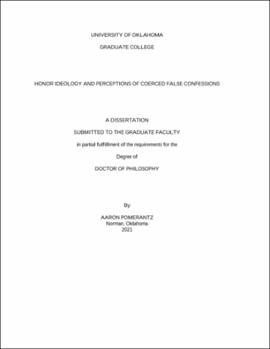| dc.contributor.advisor | Carvallo, Mauricio | |
| dc.contributor.author | Pomerantz, Aaron L. | |
| dc.date.accessioned | 2021-05-04T16:28:47Z | |
| dc.date.available | 2021-05-04T16:28:47Z | |
| dc.date.issued | 2021 | |
| dc.identifier.uri | https://hdl.handle.net/11244/329498 | |
| dc.description.abstract | Within the field of psychology and law, a great deal of research has investigated issues of jury decision-making. It is well-documented that, in addition to the formal legal restrictions and guides placed upon their behavior, jurors will also attend to (legally speaking) irrelevant factors when making determinations of guilt or sentencing. While several specific constructs have been investigated for their influence on jurors’ decision-making processes, there is a paucity of research examining the influence of culture. The four studies described herein represent an attempt at such an examination by investigating perceptions and judgements of coerced false confessions through the lens of honor ideology, a cultural framework centering around maintaining and upholding personal reputation. It is well- established that confessions, even when potentially coerced, are perceived as indicating guilt. It is also well-established that individuals coerced into falsely confessing are more likely to be convicted and, upon exoneration, stigmatized, both by juries and the public at large. Because of honor’s central value of reputation, honor endorsers might be less likely to find the idea of coerced false confessions plausible, as a coerced false confession would be perceived as voluntarily harming ones’ own reputation, and thus utterly incompatible with honor norms and worthy of stigmatization. Study 1 examines the relationship between different facets of honor and specific attitudes and beliefs about coerced false confessions and the interrogation techniques that elicit them. Study 2 examines honor’s influence on perceptions of coerced false confessors as compared to those who do not confess or those who are factually guilty. Studies 3 and 4 examine honor’s influence on perceptions and judgements of coerced false confessions in both criminal and civil jury decision-making paradigms. Results indicate honor to drive effects previously examined in the literature, including perceiving coerced false confessions as being less likely to occur and uniquely stigmatizing coerced false confessors. | en_US |
| dc.language | en_US | en_US |
| dc.rights | Attribution-NonCommercial-NoDerivatives 4.0 International | * |
| dc.rights.uri | https://creativecommons.org/licenses/by-nc-nd/4.0/ | * |
| dc.subject | Psychology, Social. | en_US |
| dc.subject | Interrogation | en_US |
| dc.subject | Culture | en_US |
| dc.subject | Honor | en_US |
| dc.title | Honor Ideology and Perceptions of Coerced False Confessions | en_US |
| dc.contributor.committeeMember | Gronlund, Scott | |
| dc.contributor.committeeMember | Song, Hairong | |
| dc.contributor.committeeMember | Brown, Ryan P. | |
| dc.contributor.committeeMember | Burge, Stephanie | |
| dc.date.manuscript | 2021-04-28 | |
| dc.thesis.degree | Ph.D. | en_US |
| ou.group | College of Arts and Sciences::Department of Psychology | en_US |
| shareok.orcid | 0000-0001-9753-5105 | en_US |

